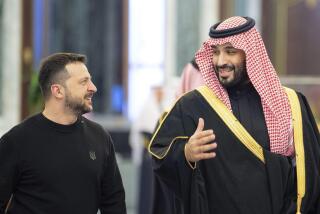Hussein, Assad Embrace, May Realign Power
DAMASCUS, Syria â Jordanâs King Hussein arrived in the Syrian capital Monday on a visit that reflects a dramatic improvement in relations between the two Arab neighbors and a possible realignment of power in a critical corner of the Middle East.
Hussein, who last visited Syria in 1979, before bilateral relations soured, embraced Syrian President Hafez Assad at the airport as a 21-gun salute was fired. They then held two rounds of talks, one a private session lasting three hours, and attended an all-male state dinner later in the evening.
Although the summit conference was a considerable feather in Assadâs cap, the Syrian authorities were characteristically circumspect on the content of the negotiations. The state-run news agency, Sana, issued a brief statement on the talks, saying they touched on âMiddle East developments, joint Arab action and bilateral relations,â but did not elaborate.
âA Better Understandingâ
Foreign Minister Farouk Shareh was quoted as saying that Syria expected the meeting to âforge a better understanding of the Arab struggle against Israel.â Both countries lost territory to Israel in the 1967 war.
Most analysts expected the talks to be more atmospheric than substantive as the two countries attempt to restore close relations after six years of official coolness.
Television film of the king embracing and kissing Assad was shown throughout the evening on both Syrian and Jordanian television, signifying the degree to which relations have improved in recent months. Jordanian and Syrian flags decorated nearly every street corner, and water tanker trucks cleaned layers of mud off the capital streets in honor of the Jordanian monarchâs visit.
Husseinâs relations with Assad began to falter in 1979 over Syrian charges that Jordan was providing shelter to anti-Assad Islamic fundamentalists known as the Muslim Brotherhood.
Although Jordan denied the charges, Hussein admitted in an extraordinary letter to his prime minister in November that members of the Muslim Brotherhood had used Jordanian territory as a staging area to attack the Syrian regime.
In 1980, the Iraq-Iran War further frayed relations, as Jordan supported Iraq and Syria supported non-Arab Iran. At one point, Syria massed troops and tanks along its border with Jordan.
The process of reconciliation began in August at an Arab summit conference in Casablanca, Morocco. Since then, the two nations have held four rounds of talks with the mediation of Saudi Arabia, whose government is believed to have offered both countries substantial financial aid as an inducement to reconcile their differences.
Peace Process Stalled
The visit takes place as the Mideast peace process launched by Hussein appears to have stalled.
Western diplomatic analysts believe that, in part, the Jordanian monarch is moving closer to Syria in an effort to place increased pressure on Yasser Arafat, leader of the Palestine Liberation Organization.
Hussein and Arafat reached agreement on Feb. 11 to pursue a joint peace initiative leading to a confederation of Jordan and an independent Palestinian state. Syria has been highly critical of the accord.
Assad is known to genuinely despise Arafat. By improving relations with Damascus, the king may be attempting to subtly warn Arafat that he is in danger of being dealt out of the Middle East card game unless he moves quickly to make substantial concessions, such as explicitly endorsing Israelâs right to exist.
Pressure on U.S.
By the same token, Hussein may be attempting to pressure the United States by openly embracing a close ally of the Soviet Union.
A significant part of the reconciliation process has taken place since the U.S. Congress postponed a $1.9-billion arms sale to Jordan.
The Syrians appears to be content to nudge the Jordanians away from the possibility of holding direct and separate negotiations with the Israelis.
Although both Jordan and Syria officially are seeking an international peace conference on the Middle East, Assad recently told visitors that he believes that little can be gained until the Arabs enjoy a strategic parity with Israel.
Jordanian officials have said the two countries are likely to exchange ambassadors after going without ambassadorial-level relations for more than 18 months.
In addition, the two countries have a wide range of bilateral questions to discuss.
More to Read
Sign up for Essential California
The most important California stories and recommendations in your inbox every morning.
You may occasionally receive promotional content from the Los Angeles Times.









